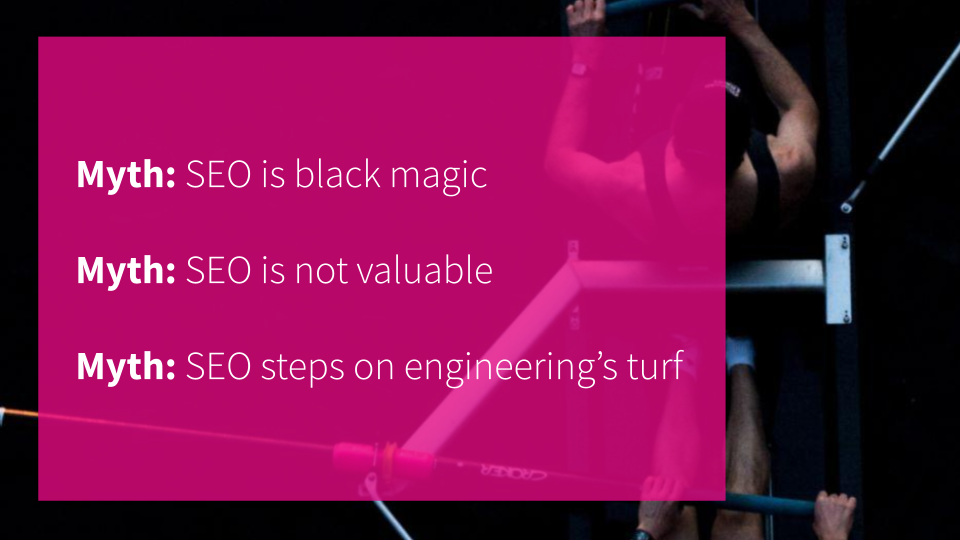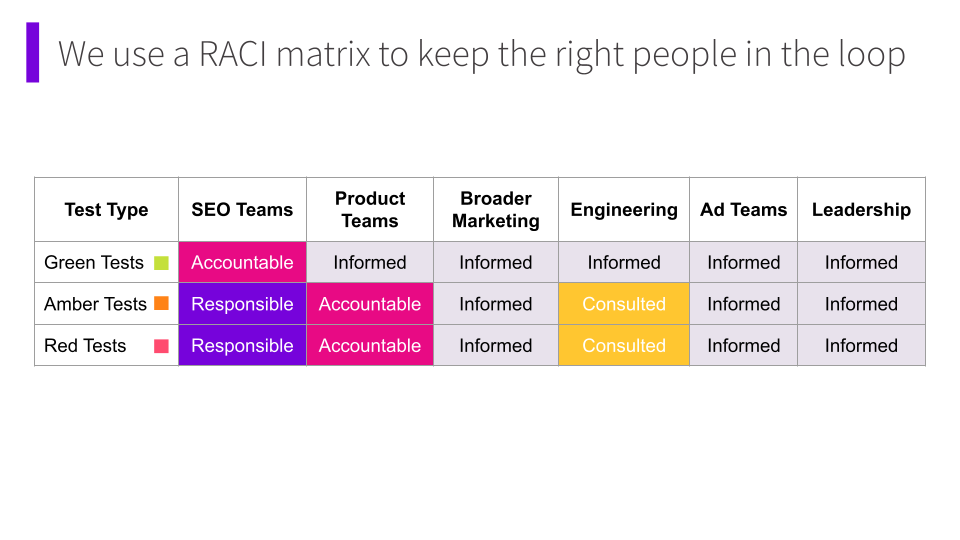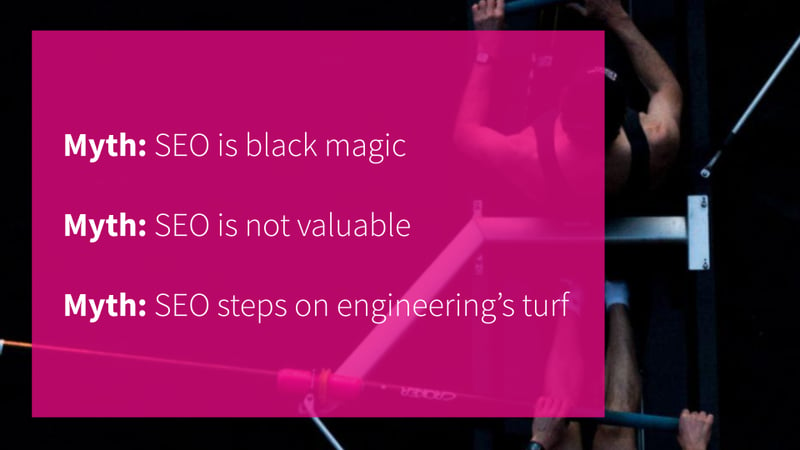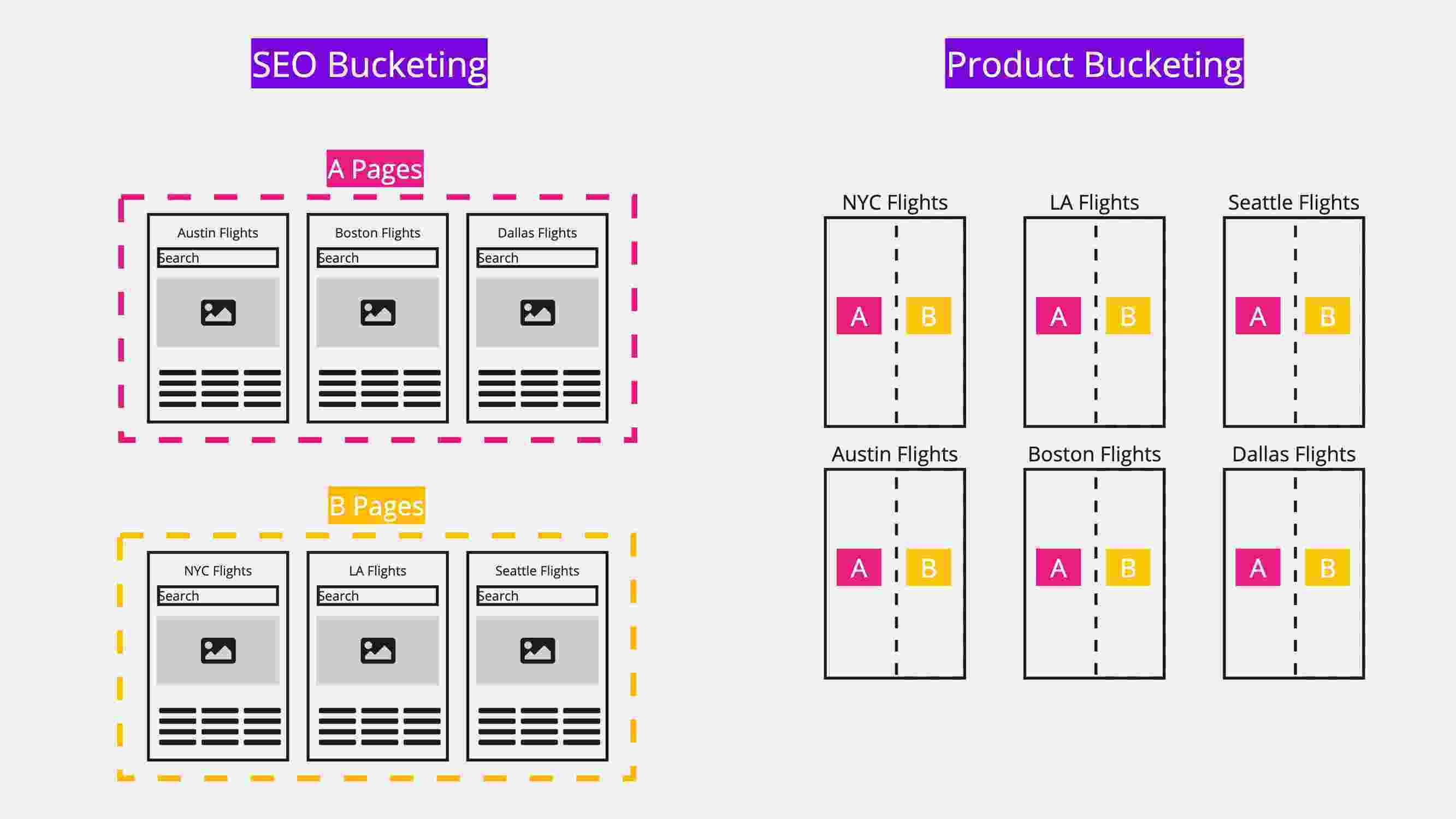Over the last 15-20 years, the SEO industry has evolved and matured a lot. Back then, you had webmasters, who were in charge of all aspects of a website, and SEO had far fewer moving parts and considerations.
Fast forward to today, SEO now has a multitude of different disciplines, from content and link-building to SEO split-testing and technical SEO engineers. These SEO engineers have a strong understanding of the engineering and development side of things, and are thus able to communicate with development teams in their ‘own language’ and have a deeper appreciation of the work, and considerations, of those engineering teams.
However, as the SEO industry continues to mature and show how valuable it is for a company’s bottom line, the process for how SEOs communicate and work with engineering teams needs to evolve alongside it.
That communication needs to be a two way street, and SEOs need to continue improving our knowledge and understanding of the engineering considerations (or objections!) around our work.
However, I wanted to start with some myths around SEO that I don’t think have entirely gone away from all engineering teams.
3 SEO myths that are still hanging around

While the SEO industry has matured a ton, there are still a multitude of myths that I sometimes find engineering teams believe about SEOs. It has definitely gotten better, but they do still come up.
Myth 1: SEO is black magic
Even just a decade ago, SEO, for better or for worse, had a reputation as being dark black magic. Yet this stigma is too often still attached to SEO teams from the perspective of engineering teams.
To be fair, SEO has been hard to keep up with for SEOs, and so it is no surprise that some developers haven’t kept up with changes. There are still sometimes ideas of stuffing meta tags and conjuring up spam, and not a lot of awareness around the complex analysis that SEOs often perform in a variety of ways.
As just one example, some engineering teams are surprised that an SEO testing platform like SearchPilot exists. In our early conversations with engineering teams, we explain what SearchPilot can do, how we measure results and share some examples of the types of tests we are able to run. We also explain the testing methodology and how that works. We often find that the engineering teams are surprised by what is possible, both technologically, but also from the POV of data-driven SEO.
Myth 2: SEO is not valuable
Another misconception is that some engineers think SEO work isn’t valuable. They are used to CRO A/B experiments proving value from the latter half of the funnel, but a lingering distrust of SEO teams makes it hard for them to ‘sell’ the value of SEO internally – and not just to engineers!
Some people can be distrustful that the changes SEO teams are asking them to make are as valuable as SEO teams are claiming. SEO teams then become frustrated that development teams or engineering teams aren’t prioritizing or taking seriously the requests that they’re making.
The best way to continue to work past this misconception is through open and honest communication, and through the use of objective data and test results. Teams need to share not only what they are working on but also why it is important and the results and impact it can bring for the business. Case studies and research from other SEO teams can also be helpful here.
Myth 3: SEO teams will step on engineering teams’ turf
In the early days of the SearchPilot journey, we anticipated that we would be bumping heads with engineering teams because SearchPilot lets you actually make changes to a website directly through our meta CMS feature. We were concerned that engineering teams were going to be upset that we were treading on their toes.
However, to our delight, we found the complete opposite! Engineering teams have been delighted that there’s a more data-driven approach to SEO that allows them to better understand the value of the work. So almost universally, engineering teams have not been hostile like we worried about and have embraced the concept of what we’re doing. I think things like Google Tag Manager are similar – it highlights that SEOs can be competent in tasks which modify the site, and it needn’t be a case of competing against the development team, but is much more symbiotic.
Best practices for how SEO and engineering teams can work better together
1. Keep lines of communication open
In order for both teams to work well together, it all starts with keeping open direct lines of communication and adapting your processes as much as possible to enable the teams to work together effectively. After all, the more clearly you can communicate the value of the work, and the easier you make it to work together, the more likely you will be to have a successful outcome.
A SearchPilot saying that lives on from our Distilled era is that ‘communication solves all problems’, and that’s definitely still something we find to be true.

SEOs need to ensure they communicate the purpose and value of work they are requesting from the engineering team, and the engineering team need to communicate the challenges that are associated with certain types of work. Where possible, it can also be helpful for SEO to have a presence in spring planning meetings, and that sort of thing, in order to be able to advocate for SEO tickets.
At SearchPilot, when we’re working with a company, we ensure that there’s communication across the whole team. For example, all of our test results get written reports. If the engineering team has any questions, they can go in and see what tests were run and exactly what was changed, because at the end of the day if we have a positive test, we’re going to be asking the engineering team to then do some work to enact that change on their website. If they’ve been involved in the whole process, it makes everything much easier.
2. Add data driven insights to process
SEO and engineering teams are bound to butt heads at some point, but some adaptation and compromise is necessary. When communication is open you can make it clear that each team is not there to impose their way of doing things on them. Instead, each team can add the data-driven insights that they maybe didn’t have before into that existing SEO process or that existing development process.
3. Integrate into the engineering team’s systems and processes
While not every company is able to do this, we recommend integrating your SEO strategy with the ways that engineering and marketing teams work. For instance, there are always differences in how teams want to do QA, how they are going to integrate the change that they’ve tested, and how they are going to integrate that back into the backend to their website.
Regardless of the team we recommend SEO and engineers start to understand how they can fit into one another’s existing processes so no one is swimming upstream. At SearchPilot we’ve seen immense value in doing the testing that we do without adding huge amounts of overhead or complexity to the day-to-day work of the engineering team.
Tying it all together with SearchPilot
Every team has different challenges, different histories, and different roadblocks.
Ultimately, SearchPilot helps solve this communication gap between teams because it enables us to prove in a quantitative way what the benefit of our work is.
So, not only can engineering teams better understand the value of the work SEO teams are asking them to do, but also can better prioritize the changes they are asked to do. Now you can lead with, “Well, we’ve tested these, and there are 30% of them with negative outcomes. So let’s not bother doing those.”
So, each team can do more focused work and are better able to communicate the benefit of that work.
To reiterate, we can really drive down into details and say things like, “There’s going to be a 3.4% uplift of traffic to these pages if we make this change.” So it’s very easy to add those quantifiable numbers, but from an engineering team perspective, there’s still a return on investment calculation to be done there. Is it worth the effort for them to make this change? With Search Pilot we can point to specific changes, and tie it to specific outcomes, in a way that historically hasn’t been possible in SEO.
Ready to take a more scientific approach to SEO split-testing? Request a free demo of SearchPilot.
Image credit: Josh Calabrese.



